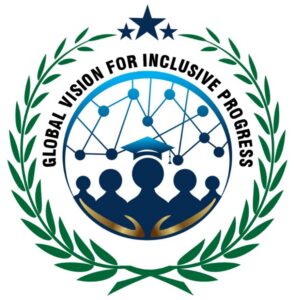Education & Literacy
Education Services
The ultimate goal of Globall Vision For Inclusive Progress (GVFIP) Education and Literacy service is to promote education for human and institutional development. Some of the initiatives that we have undertaken include public-private partnerships, Npnon-formal education, scholars academies, early childhood development, and adult literacy programs
Child Safe Spaces
Child psychosocial well-being refers to the emotional, social, and psychological development of a child. It encompasses their ability to form relationships, express their feelings and navigate the world around them. A child’s psychosocial well-being is shaped by a variety of factors including genetics, environment, experiences and relationships with others. A positive and supportive environment, nurturing relationships with caregivers and opportunities for socialization and learning all contribute to a child’s psychosocial well-being. Conversely, adverse experiences such as neglect, abuse or trauma can negatively impact a child’s psychosocial development and lead to long-term consequences. It is important for caregivers, educators and mental health professionals to prioritize a child’s psychosocial well-being in order to promote their healthy development and overall well-being
Early Childhood Development (ECD)
This program targets children from 3-5 years of age from impoverished backgrounds. The aim is to support children’s overall personality development sustainably in a safe learning environment. To ensure the provision of quality education, teachers are trained in ECD methods. The initiative helps reduce dropout rates and increase retention rates.
Adult Literacy
Through this model, Global Vision For Inclusive Progress (GVFIP) Education and Literacy Program, strives to provide opportunities for illiterate adults. Adult Literacy Centers cater to adults, which is why academic learning and skill development are focused on simultaneously helping illiterate adults. It becomes a productive part of the society.
School Cluster Policy-A pilot project
The objective of the school clustering policy is to support the Sindh Education and Literacy Department is to smoothly implement thef School Clustering Policy and enhance the capacity of the relevant stakeholders to advance the level through field coaching so that new delegated powers can be exercised by the cluster schools’ head teachers and technical support to the government of Sindh, for scaling up the clustering policy execution and develop the monitoring and reporting system
Child Safe Spaces
Child psychosocial well-being refers to the emotional, social, and psychological development of a child. It encompasses their ability to form relationships, express their feelings and navigate the world around them. A child’s psychosocial well-being is shaped by a variety of factors including genetics, environment, experiences and relationships with others. A positive and supportive environment, nurturing relationships with caregivers and opportunities for socialization and learning all contribute to a child’s psychosocial well-being. Conversely, adverse experiences such as neglect, abuse or trauma can negatively impact a child’s psychosocial development and lead to long-term consequences. It is important for caregivers, educators and mental health professionals to prioritize a child’s psychosocial well-being in order to promote their healthy development and overall well-being


